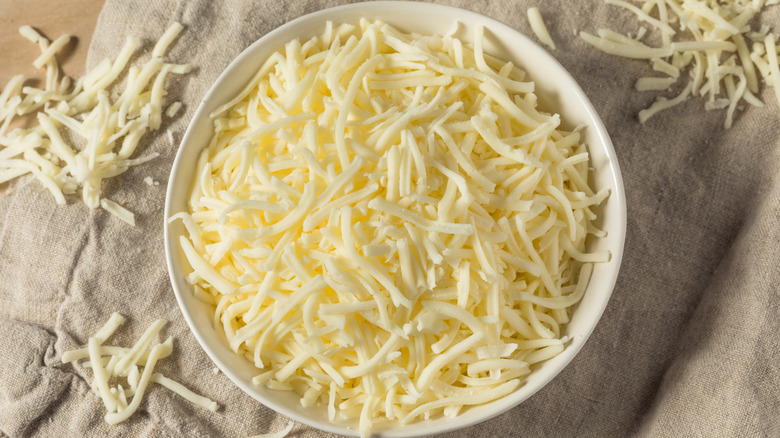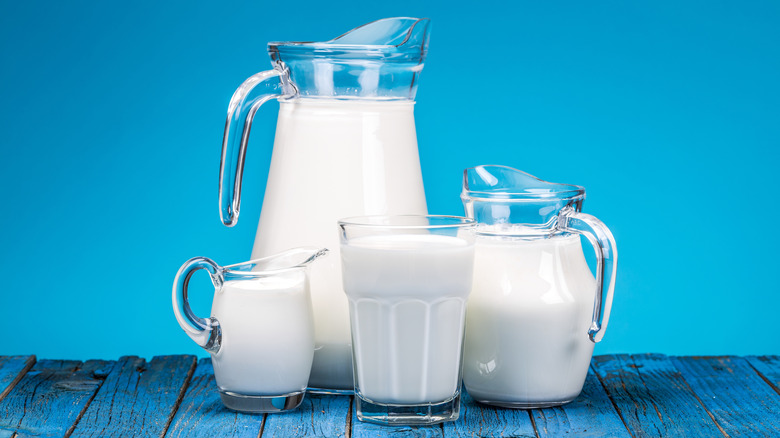The Unexpected Cheese That Has More Calcium Than A Glass Of Milk
Our bones are home to 99% of all calcium in the human body, according to experts at Harvard T.H. Chan. While essential to the strength and health of our skeleton, the mineral also supports muscle contraction, helps us maintain a normal heartbeat, and aids in blood coagulation and nerve functioning.
For adult women between the ages of 19 and 50, it is recommended to get 1,000 milligrams (mg) of calcium each day. This number rises to 1,200 mg for women over the age of 50. Men who are 19 years of age through 70 years old are also advised to get 1,000 mg of calcium daily or 1,200 milligrams if they're older than 70. If you're not getting calcium through supplementation, your other option is to eat calcium-rich foods.
Your mind probably jumps to milk first and foremost. According to the U.S. Department of Agriculture (USDA), 1 cup of whole milk contains 366 mg of potassium, 246 mg of phosphorus, a little over 29 mg of magnesium, and a substantial 300 mg of calcium. "People know milk and calcium go hand in hand," Jessica Ziehm, the executive director of the advocacy group New York Animal Agriculture Coalition, told The New Yorker. Capitalizing on this, you could easily spot a "Got Milk?" commercial nearly everywhere you looked during the early 2000s. However, there's one type of popular cheese that may be even more effective at meeting our daily calcium needs.
Mozzarella cheese is rich in calcium
It's on your pizza, in your Caprese salad, and melting out of your fried cheese sticks. Yes, you guessed it — mozzarella cheese. Derived from either cow's milk or buffalo's milk, what makes mozzarella cheese so unique is its elasticity, which is born from a careful heating and cooling process that involves the right amount of pH and calcium in the curd, according to a 2021 scientific review published in Food Technology & Biotechnology.
As we already know, 1 cup of whole milk contains 300 mg of calcium (per USDA). In 1 cup of shredded mozzarella cheese, however, you'll get 566 mg of calcium, reports the USDA. You'll also get the added benefits of nearly 400 mg of phosphorus, approximately 85 mg of potassium, 22.4 mg of magnesium, and roughly 25 grams of protein. That being said, 1 cup of mozzarella cheese made with whole milk also contains a fair amount of sodium, 544 mg to be exact. For comparison, 1 cup of whole milk has 92.7 mg of sodium. The U.S. Food & Drug Administration advises limiting daily sodium intake to no more than 2,300 mg. Knowing this, just 1 cup of mozzarella cheese gets us nearly one-quarter of the way there. Therefore, it is best consumed in moderation.
Mozzarella cheese in comparison to other types of milk
Of course, not all of us choose to drink whole milk. Some people may instead opt for skim milk, 1% milk, almond milk, or a host of other options. Does mozzarella cheese still come out on top for calcium content when compared to these different kinds of milk? Let's see.
In 1 cup of fat-free skim milk, you'll find 322 mg of calcium (per USDA) compared to the 566 mg you'll get in 1 cup of shredded mozzarella cheese. Clearly, mozzarella wins by a long shot. Alternatively, 1 cup of low-fat 1% milk with added vitamins A and D has 310 mg of calcium (per USDA). Again, mozzarella still reigns supreme. The same is true when looking at plant-based milk products. You'll find 158 mg of calcium in a 100-gram serving of unsweetened, refrigerated almond milk while the same size serving of mozzarella cheese contains 505 mg of calcium (per USDA). Similarly, in the same size serving of soy milk, another dairy alternative, you get just 123 mg of calcium (per USDA).
Mind you, calcium can be found in more places than just milk and cheese. Experts at Harvard T.H. Chan note that yogurt, spinach, beans, nuts, winter squash, and salmon are also great options.



